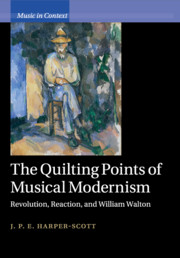4 - Communist modernism
from PART III - THE REVOLUTIONARY KERNEL OF REACTIONARY MUSIC
Published online by Cambridge University Press: 05 September 2012
Summary
If, in terms of political thought and practice, of forms of collective life, humanity has yet to find and will not find anything better than currently existing parliamentary states, and the forms of consciousness associated with them, this proves that as a species, said humanity will not rank much higher than ants and elephants. The communist idea at least had the merit of announcing a fate that would be a little more capable of inscribing itself in the annals of the Universe.
Walton in the sequences of communism
Having examined Troilus and Cressida in the last chapter as an Evental site for the understanding of love and sex rather than in relation to music-historical terms such as modernism, it is time to address the critical understanding of Walton's place in that musical and political history. Through it we can reformulate the category of modernism as such.
The first obvious point to make about the political situation of Walton, who lived from 1902 to 1983, is that the entire period of his adulthood was lived under the truth-Event of communism. This is therefore the basic premiss of my discussion of the political intelligibility of his works. But the idea of communism has received a new theoretical articulation in recent years, perhaps most interestingly in the work of Badiou, Žižek, and Bosteels, and the terms in which I mean to apply it need to be clarified quickly.
- Type
- Chapter
- Information
- The Quilting Points of Musical ModernismRevolution, Reaction, and William Walton, pp. 149 - 196Publisher: Cambridge University PressPrint publication year: 2012



